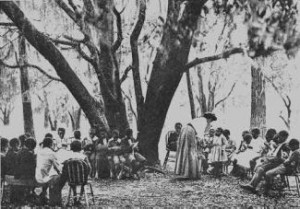Of the hundreds of escaped slaves in South Carolina and Georgia fleeing to Union-controlled Port Royal Island, South Carolina, many are Baptists. While the stories are joyful in that freedom is obtained, there are often elements of hardship and sadness in the journey away from captivity, as U.S. Colonel Thomas Wentworth Higginson, abolitionist and the commander of a regiment of former slaves from the Deep South, records in his journal today.
“…There is a pretty laundress here, a soldier’s wife, Fanny Wright, who had a baby shot in her arms, escaping from the main land in a boat. There is a family of Millers, whose mother a grand old woman was here New Year’s Day; she attempted to escape near Savannah but failed and while her husband was receiving 500 lashes, collected 22 of her children and grandchildren and tried again – hid them in a marsh till night, then found a flat boat which had been rejected by the rebels as unseaworthy, put them on board and came forty miles to our lines. One of my officers saw them when they came in. The old woman stood up tall and erect with children in her arms and as they touched the shore, said “My God, are we free?”
There is another family of Wilsons of which there are several representatives in this regiment. Three or four sons deliberated about escaping and finally selected the youngest to remain to take care of the old mother. The others with their sister and her children came in an old dugout canoe. They were five men in a boat, and they were shot at by rebel pickets and every man was wounded. A little girl of nine (who was here on New Year’s Day) said, when they fired on “Don’t cry Mother, Jesus will help you,” and she began to pray, with the shots flying about. Captain Townbridge was on the naval vessel which took them up; the mother and child had been living 9 months in the woods and the child would not speak to anyone. He asked the mother if she would not let him adopt the child and she said “I would do anything for oonah but that.” (oonah is the plural for you, they sometimes use it) This mother is almost white, her father was white and her grandmother Indian; she said that the negroes on their prayer meetings at Savannah prayed that the Yankees might take the city and that when Fort Pulaski was taken, thousands of slaves got ready to come to us. Captain Townbridge has since seen a Savannah paper in which Mother and Child were described and a reward offered.”
Source: Thomas Wentworth Higginson, Christopher Looby, The Complete Civil War Journal and Selected Letters of Thomas Wentworth Higginson, Volume 53, University of Chicago Press, 2000, p. 101 (link)



